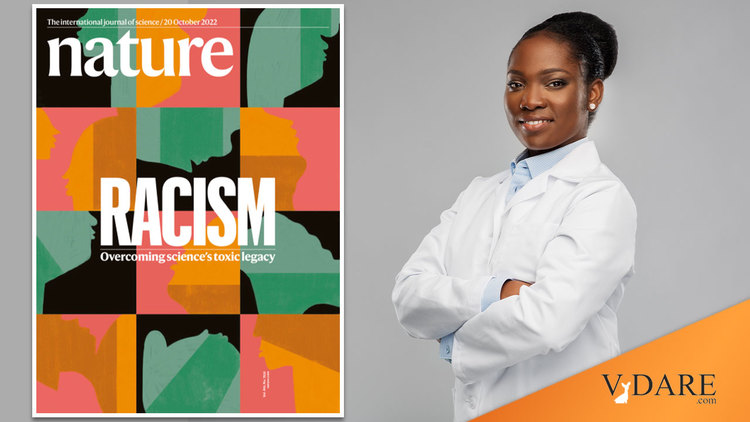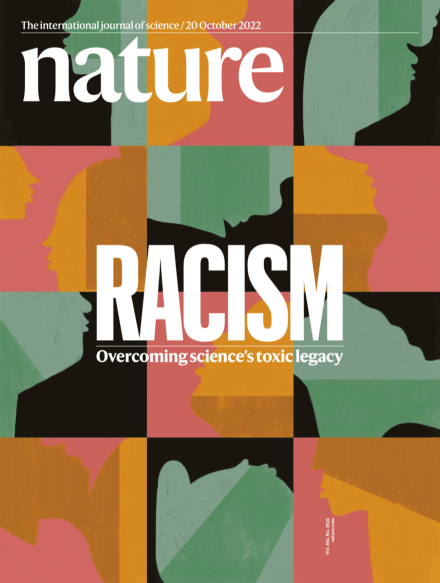This special issue is our ‘message in a bottle’ from the troubled ship of science. We urge readers to find it. Open it. Act on its contents.

By Steve Sailer
10/20/2022
As genetic data continues to pour in, the scientific evidence is piling up that, not surprisingly, some of the behavioral differences among human ancestral groups (aka races) have their roots in different evolutionary paths in different parts of the world. But it would be embarrassing for many important people to admit they were wrong by taking an extremist position on the Nature-Nurture question. So, momentum is building to ban doing science on the really big questions of human nature.
Nature, the famous British science journal, has a special issue on “Racism” devoted to Scientists of Color kvetching about how mean everybody is to them. No word yet on whether hair-touching is alleged.

Volume 610 Issue 7932, 20 October 2022
RacismRacism casts a huge shadow on science. People of colour and from other historically marginalized groups have been excluded from the scientific enterprise, research has been used to underpin discriminatory thinking, and research outputs have ignored and further disadvantaged marginalized people. Nature has played its part in creating this divisive legacy. In this special issue — the first in the journal’s 153-year history to be overseen by guest editors — Melissa Nobles, Chad Womack, Ambroise Wonkam and Elizabeth Wathuti present articles that examine some of the ways racism has manifested in science, and the direct and detrimental effects this toxic ideology has had on individuals and their communities. By highlighting these issues, Nature aims to help build a more inclusive future for science, and society, in which people of all colours can thrive.
Racism in science
- Editorial
Ending racism is key to better science: a message from Nature’s guest editors This special issue is our ‘message in a bottle’ from the troubled ship of science. We urge readers to find it. Open it. Act on its contents.
Nature thanks the guest editors of our racism in science special issue This special issue is part of Nature’s commitment to change. We thank our inspiring guest editors for helping us to make it happen.
- News Features
‘It’s a constant hum’: a planetary geologist calls out racism in academia Martha Gilmore has faced not only accusations of theft and lying, but also quiet isolation and the pain of watching racism bear down on others.
The first Indigenous female surgeon in Canada is battling for health justice Nadine Caron was appalled to hear racist views about Indigenous health from a project adviser. So she’s fighting to change perceptions.
The geoscientist fighting for universities to confront systemic racism Christopher Jackson felt obligated to speak out against racism in UK institutions, but a lack of support left him disillusioned with academia.
‘There’s no space for us’: an Indigenous-health researcher battles racism in Australia Chelsea Watego saw a message in the cold, cramped office space she was given. She decided to fight back.
‘I was treated as if I was dirty’: a paediatrician decries racism against African scientists Nadia Sam-Agudu is tired of how international funders and collaborators infantilize her and her colleagues.
Computer science has a racism problem: these researchers want to fix it Black and Hispanic people face huge hurdles at technology companies and in computer-science education in the United States, with far-reaching consequences for science and all of society.
- Comment
Counter the weaponization of genetics research by extremists Geneticists must rethink how they conduct their research and how they communicate results.
This last bit is by actual scientists, genetical anthropologists who had the misfortune to have one of those mass-shooters-with-a-manifesto cite their work to show that Race Does Not Exist isn’t true.
It strikes me that the most effective way to cut down on white racist mass-shooters-with-a-manifesto would be to:
But the geneticists in Nature figure what’s crucial is to double down on the old saws, such as that Africa has the most diversity and something something something, therefore, Race Does Not Exist!
So what should human geneticists be doing to counter white supremacy?
Many of the denunciations of racism by scientists, scientific societies and editorial boards invoke decades of human-genetics research debunking the idea that human ‘races’ are biologically distinct, and repeatedly emphasize instead that race is a shifting social, historical and political construct. They stress that most human genetic variation is distributed as a gradient; that there is considerable genetic overlap between members of different populations; and that today’s patterns of genome variation can be explained by migration and mixing of populations during human history7.
But despite such denunciations, the past 15 years of population genetics have also unwittingly provided fodder for the concept that differences between so-called ‘races’ have a biological basis. …
One example is the widely distributed figure from a 2008 study (co-authored by one of us) that was included in the Buffalo shooter’s screed. In the figure, which uses HGDP data, genetic ancestry seems to correspond to seven major continental designations: Africa, Middle East, Europe, central and south Asia, East Asia, America and Oceania.
A slightly more subtle set of racial categories than what the US Census uses.
This purported finding is based on an analysis in which 86.5% of the populations represented were from outside Africa and only 13.5% were from within Africa.
That’s roughly proportional to Africa’s percentage of the world population.
It does not align with results from genetic data sets that use broader sampling across the continent. Those data indicate that the level of genetic variation in Africa is equivalent to that in many intercontinental comparisons, such that it does not make sense to label a single reference group or ancestry as ‘African.’
Our unpublished analysis shows that if the authors of the 2008 study had had access to a more diverse data set — with 85% of the populations selected from within Africa, and the other 15% from outside the continent — and had allowed for seven subdivisions of genetic ancestry as in the original study, the data from African populations would no longer fall into a neat cluster that lies apart from all the others (see ‘Racists use geneticists’ infographics’ and Supplementary information).
Well, duh, it’s been recognized for practically ever that you could divide the population of Africa up into various racial groups depending on your splitter-lumper proclivities, most obviously North African Caucasoids vs. sub-Saharan Negroids, to use Carlton Coon’s terms. But you could also break out one of the tiny old races of sub-Sahara. For example, the old-fashioned caliper skull-measuring physical anthropologist Coon in his 1965 Living Races of Man listed Capoid (Bushmen and Hottentots) as a third major race of Africa. Coon appeared to come pretty close to adding a fourth, Pygmoid, but stopped with three. And the mainstream sub-Saharans could be divided, if you were in a splitting mood, into Western (sprinter) and Eastern (distance runner) groups. And so forth and so on.
The authors argue that if you wanted to divide the world population up into 7 races, you’d come out with two out of Africa:
But you’d have five still-in-Africa races:
In other words, the biggest genetic divide in humanity is between Out-of-Africa peoples and Still-in-Africa peoples.
But, let’s be honest. Nobody much cares about Khoi-San or Pygmies. Instead, what everybody gets worked up over is African-Americans.
And African-Americans are distinctive and, despite varying but not too varying amounts of white admixture (and a tiny bit of American Indian admixture), pretty homogeneous in terms of their African genetic contribution. I’ve long been looking for evidence of the existence of Pygmy-Americans or Bushman-Americans, but I haven’t seen any since an 1896 Popular Science article asserting there might be Pygmy villages in the deepest forests of the South.
23andMe.com claims to be ready to break out your “African Hunter-Gatherer” ancestry to one decimal place, but I haven’t heard of how many they’ve found in America. Similarly, Ancestry.com has a page set aside for “Hunter-Gatherers of South Central Africa,” but no word on what percentage of their customers register as one.
Most African-Americans are descended from West Africans and/or the closely related Bantu Expansion. For example, Nigeria and Zambia are 3,500 miles apart, but Reich reports:
… the frequencies of mutations in groups in Nigeria and in Zambia are more similar than the frequencies of mutations in Germany and Italy despite the former two countries being separated by a far greater geographic difference.
This is a content archive of VDARE.com, which Letitia James forced off of the Internet using lawfare.